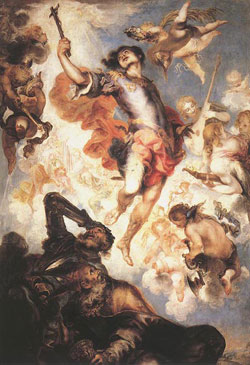
Feastday: April 13
Patron: of Seville, Spain
Death: 586
Prince of Visigothic Spain, and martyr. He was the son of Leovigild the Visigoth, king of Spain, and was raised as an Arian. His wife, Indegundis, converted him from that heresy, which brought about his disinheritance by Leovigild and his defeat at Seville, Spain, by his father. When Hermenegild refused to accept Arianism, he was axed to death. His feast is now confined to local calendars.
For the given name, see Hermenegild (given name). For the Spanish military decoration, see Royal and Military Order of Saint Hermenegild.Saint Hermenegild or Ermengild (died 13 April 585; Spanish: San Hermenegildo; Latin: Hermenegildus, from Gothic *Airmana-gild, "immense tribute"), was the son of king Liuvigild of the Visigothic Kingdom in the Iberian Peninsula and southern France. He fell out with his father in 579, then revolted the following year. During his rebellion, he converted from Arianism to Chalcedonian Christianity. Hermenegild was defeated in 584 and exiled. His death was later celebrated as a martyrdom due to the influence of Pope Gregory I's Dialogues, in which he portrayed Hermenegild as a "Catholic martyr rebelling against the tyranny of an Arian father."
Marriage to Ingund
Hermenegild was the eldest son of Liuvigild and his first wife, Princess Theodosia, a Chalcedonian Christian. He was a brother of Reccared I and brought up an Arian. Liuvigild made his sons co-regents.
In 579, he married Ingund, the daughter of the Frankish King Sigebert I of Austrasia who was a Chalcedonian Christian. Her mother was the Visigoth princess Brunhilda of Austrasia. The twelve-year-old Ingund was pressured by Hermenegild's stepmother Goiswintha to abjure her beliefs, but she stayed firm in her faith.
Liuvigild sent Hermenegild to the south to govern on his behalf. There, he came under the influence of Leander of Seville, the older brother of Isidore of Seville. Hermenegild was converted to Chalcedonian Christianity. His family demanded for him to return to Arianism, but he refused.
Around then, he led a revolt against Liuvigild. Contemporary accounts attribute that to politics, rather than primarily religious differences. He asked for the aid of the Byzantine Empire, but it was occupied with defending itself from territorial incursions by the Sasanian Empire. For a time, Hermenegild had the support of the Suebi, who had been defeated by Liuvigild in 579, but he forced them to capitulate once again in 583.
Hermenegild fled to Seville and when it fell to a siege in 584, he went to Córdoba. After Liuvigild paid 30,000 pieces of gold, the Byzantines withdrew and took Ingund and her son with them.
Hermenegild sought sanctuary in a church. Liuvigild would not violate the sanctuary. He sent Reccared inside to speak with Hermenegild and to offer peace. That was accepted, and peace was made for some time.
Imprisonment and death
Goiswintha, however, brought about another alienation within the family. Hermenegild was imprisoned in Tarragona or Toledo. During his captivity in the tower of Seville, an Arian bishop was sent to Hermenegild for Easter but he would not accept the Eucharist from him. King Liuvigild ordered him beheaded; he was executed on 13 April 585.

